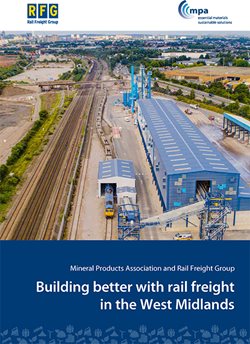 Greening the construction supply chain in the West Midlands using lower-carbon rail freight requires Government backing to unlock significant untapped potential.
Greening the construction supply chain in the West Midlands using lower-carbon rail freight requires Government backing to unlock significant untapped potential.
That’s according to a new report from the users and operators of rail transport who have joined forces to call on the Government for help to ensure the post-Covid recovery is more sustainable through the increased use of rail freight to supply construction in the West Midlands.
The Mineral Products Association (MPA), whose members supply 160 million tonnes of primary aggregates each year, and the Rail Freight Group (RFG), which represents the UK’s rail freight sector, have published Building better with rail freight in the West Midlands highlighting the many benefits of moving materials by train.
Mineral products companies currently transport up to 20 million tonnes of aggregates by rail but the report explains that there is potential to do more with the support of the Government in several key areas.
City regeneration schemes, infrastructure improvements and new homes all require large volumes of aggregates such as granite and limestone, as well as cement, to be brought in from elsewhere in the country. Rail freight produces 76% less carbon dioxide and a fraction of the particulates compared to the equivalent road journeys. Just one ‘jumbo’ train can carry 3,600 tonnes of stone, equivalent to 125 lorries. So it is vital that rail freight operators are able to transport essential materials reliably and efficiently across the region.
In the West Midlands, the mineral products sector has invested millions of pounds in new rail sites and improvements to their operations, resulting in a 50% increase in rail freight over the past decade and a dramatic reduction in HGV journeys, congestion and carbon emissions.
But to have any chance of moving towards net zero carbon, the sector is looking to the Government to back its commitments by recognising the importance of rail in reducing emissions, then increasing capacity on the network and ensuring the costs are designed to encourage more use of rail.
The report calls for fair and affordable track charges, site rents and new connections, and the safeguarding of existing rail depot sites to prevent redevelopment or other incompatible developments nearby. Operators are also asking for freight to have a higher priority and greater flexibility in the timetable, and a commitment from Government to a programme of rail electrification so companies can align their own future investments.
Robert McIlveen, MPA Director of Public Affairs, said: “The mineral products industry is the largest user of rail freight in terms of ‘tonnes carried’ and the Government needs to recognise that these materials are vital to delivering the vision of building back better. MPA members are keen to use more rail freight because of all of its strengths, in particular on carbon emissions, transport efficiency and reduced road congestion. With the new capacity released by HS2 later this decade, if we can make it easier to connect there is lots of growth potential.”
Maggie Simpson, RFG Director General, said: “The West Midlands is a growing economy and rail freight is helping to ensure that essential infrastructure can be built sustainably using low carbon logistics. With the right policies in place we can do more, removing HGVs off the road network and powering the construction of the railways, road, offices and new homes that the region needs to prosper.”
Rail freight delivers economic benefits of £2.45bn to the UK economy each year – including £1.65bn in productivity benefits for customers and £800m of benefits to wider society, through environmental gains, reduced congestion and improved safety.
Ends
Note to Editors:
The ‘Building better with rail freight in the West Midlands’ report can be found here.
About the Mineral Products Association:
The Mineral Products Association (MPA) is the trade association for the aggregates, asphalt, cement, concrete, dimension stone, lime, mortar and silica sand industries. With the merger of British Precast, and affiliation of the British Association of Reinforcement (BAR), Eurobitume, MPA Northern Ireland, MPA Scotland and the British Calcium Carbonate Federation, it has a growing membership of 520 companies and is the sectoral voice for mineral products. MPA membership is made up of the vast majority of independent SME quarrying companies throughout the UK, as well as the 9 major international and global companies. It covers 100% of UK cement and lime production, 90% of GB aggregates production, 95% of asphalt and over 70% of ready-mixed concrete and precast concrete production. In 2018, the industry supplied £16 billion worth of materials and services to the Economy. It is also the largest supplier to the construction industry, which had annual output valued at £172 billion in 2018. Industry production represents the largest materials flow in the UK economy and is also one of the country’s largest manufacturing sectors.
www.mineralproducts.org
About the Rail Freight Group
Rail Freight Group (RFG) is the representative body for rail freight in the UK. Our members include rail freight operators, logistics companies, ports, equipment suppliers, property developers and support services, as well as retailers, construction companies and other customers. Our aim is to increase the volume of goods moved by rail.
http://www.rfg.org.uk
For media enquiries, contact Elizabeth Clements at: Elizabeth.Clements@mineralproducts.org ; tel: 07775 894 285.